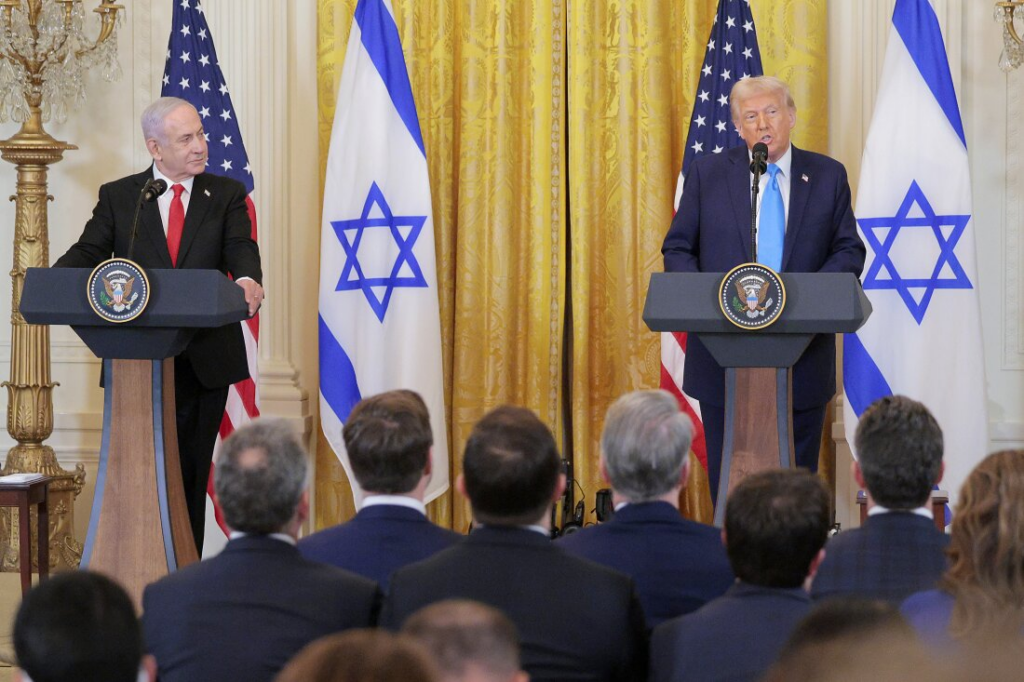
The Trump administration faced a storm of criticism following President Donald Trump’s proposal to have the U.S. “take over” Gaza, leading to a swift effort to temper the plan amid international condemnation and warnings against “ethnic cleansing”.
Administration attempts damage control
Faced with backlash from Palestinians, Arab governments, and world leaders, key figures within the Trump administration sought to clarify the President’s remarks. Secretary of State Marco Rubio suggested any relocation of Gazans would be temporary, while the White House insisted there was no commitment to deploying U.S. troops.
Despite the uproar, Trump maintained that “everybody loves” the plan, a statement he made during a White House press conference alongside Israeli Prime Minister Benjamin Netanyahu, eliciting audible gasps from those in attendance.
The contentious proposal
Offering scant details on how the U.S. could manage the transfer of over two million Palestinians or govern the war-torn territory, Trump declared on Tuesday: “The US will take over the Gaza Strip, and we will do a job with it, too. We’ll own it”. Rubio attempted to soften the impact, describing the idea as “not meant as hostile” but rather a “generous move — the offer to rebuild and to be in charge of the rebuilding”.
White House Press Secretary Karoline Leavitt later clarified that Washington would not finance Gaza’s reconstruction following more than 15 months of conflict between Israel and Hamas, a U.S. ally. She emphasized that U.S. involvement “does not mean boots on the ground” or that “American taxpayers will be funding this effort”.
International condemnation
The United Nations issued a stark warning against ethnic cleansing in Gaza. “At its essence, the exercise of the inalienable rights of the Palestinian people is about the right of Palestinians to simply live as human beings in their own land,” stated Secretary-General Antonio Guterres. His spokesman, Stephane Dujarric, added that “any forced displacement of people is tantamount to ethnic cleansing”.
Presidents Emmanuel Macron of France and Abdel Fattah al-Sisi of Egypt jointly declared that any forced displacement of Palestinians would be unacceptable. “It would be a serious violation of international law, an obstacle to the two-state solution, and a major destabilizing force for Egypt and Jordan,” they stated.
Palestinian and Arab opposition
Palestinian officials, Arab leaders, and various rights groups were quick to denounce Trump’s remarks. Hamas, which has controlled Gaza since 2007, rejected the proposal, labeling it “racist,” “aggressive,” and inflammatory.
Leavitt clarified that Trump envisioned Palestinians being only “temporarily relocated” from Gaza, citing the territory’s current state as “a demolition site right now. It’s not a liveable place for any human being”.
Gaza in ruins
Israel’s military offensive, initiated in response to Hamas’s October 2023 attack, has devastated much of Gaza, including vital infrastructure such as schools and hospitals. Human Rights Watch has accused Israel of implementing “a calculated policy to make parts of the strip unlivable,” with regional director Lama Fakih asserting that Trump’s proposal “would move the US from being complicit in war crimes to direct perpetration of atrocities.”
Despite Trump’s implications that Gaza would not be rebuilt for Palestinians, Leavitt later stated that he expected Egypt, Jordan, and others “to accept Palestinian refugees, temporarily, so that we can rebuild their home”. Even before Trump’s controversial proposal, he had suggested that Gazan residents should relocate to Egypt and Jordan.
However, Palestinians have vowed to remain steadfast. “They can do whatever they want, but we will remain steadfast in our homeland,” declared Ahmed Halasa, a 41-year-old Gaza resident.
Netanyahu’s support
In Washington, Netanyahu hailed Trump as Israel’s “greatest friend” and lauded his “willingness to think outside the box”. Speaking to Fox News, he described Trump’s proposal as “the first good idea that I’ve heard,” adding, “It’s a remarkable idea, and I think it should be really pursued, examined, pursued and done, because I think it will create a different future for everyone”.
Netanyahu also suggested that the plan did not necessarily entail Palestinians permanently leaving the territory. “They can leave, they can then come back, they can relocate and come back, but you have to rebuild Gaza,” he stated.
Conflict context
The Gaza conflict was ignited by a Hamas attack on Israel in October 2023, resulting in the deaths of 1,210 people, predominantly civilians, according to an AFP tally based on Israeli official figures. Israel’s retaliatory actions have led to the deaths of at least 47,518 people in Gaza, the majority of whom were civilians, according to the Hamas-run territory’s health ministry, figures considered reliable by the United Nations.






